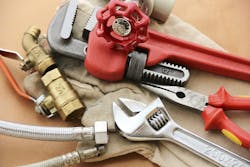The term “tools of the trade” can be applied universally to all forms of endeavor. From manual labor to the most high-tech software applications, each have specific tools that are considered basic to a particular job. Some jobs require more tools than others and some tools are specific to a particular use. In the greater scheme of things, tools, both the manufacture and use of them, are what separate man from the rest of the animal kingdom. There are exceptions, of course, but for the most part this is true.
Over the centuries, trade tools have been developed for handling jobs generally, and then, more refined tools were made for handling specific products and jobs. Originally, tools were invented to solve a particular problem, whether that problem was aiding the user to do something he couldn't do without the tool, or by making something he could do easier. As tools were invented for specific purposes, they were copied and modified further by others. Eventually, they were acquired and adapted for use by individuals or groups, and either modified, or taken whole, into specific trades.
A plumber's tool kit speaks volumes about his abilities, trade knowledge and experience. What a plumber carries in his tool box, or on his truck, can tell you a lot about that person. There are ubiquitous tools that almost all plumbers have: water pump pliers, gas pliers, screwdrivers, ball peen hammers, claw hammers, hand sledge hammers, pipe wrenches, crescent wrenches, allen wrenches, cold chisels, etc. Aside from these basics, there are tools which can form a much more nuanced picture of the person to whom they belong. These tools can tell you, for example, if that journeyman does service work, remodel or repair work, new construction, residential, commercial or industrial work or all of the above. They can also inform as to the level of expertise such tools imply.
I'm using generalities here, so please bear with me. A guy who has a full set of “easy-outs” probably has done his share of service work. Likewise, if the truck carries rodding (sewer snake) equipment and portable remote viewing electronics, it's a safe bet that the owner or driver handles service work. Various types of drills, reciprocating saws and power drivers indicate nothing so much as a plumber's personal preferences, but laser levels, transits and other such tools would indicate a plumber who does commercial work where the foundations and site prep are too large or broad for simple spirit levels and tape measuring. Ditto, cast iron snappers, ratchet snappers and chop saws.
Pipe threading equipment is not an indicator, because all facets of the trade, at one time or another, might require the threading of a piece of steel pipe, but a production type threading machine with a multi-use cradle of pipe cutter, dies, reamer and recirculating oiler would pretty much indicate a commercial plumbing application.
A broad selection of tools for very specific jobs might indicate a well experienced and widely knowledgeable plumber, while a sparsely filled tool kit might be a sign of an apprentice or someone who has only worked in one small area of the trade.
How someone treats their tools is another indicator. In times past, many journeymen would soak their tools in cutting oil when they went on vacation or had some time off, so that they were well, and fully, lubricated when needed to return to work. Keeping one's tools sharp, clean and lubricated is a common sense thing to do, but it isn't universally done these days.
Personally, I have tools which were handed down from my grandfather and are well over 100 years old.
Nothing says “amateur” more than someone who treats the tools of their trade as expendable. Personally, I have tools which were handed down from my grandfather and are well over 100 years old. Some are for processes and materials which are no longer used, but others, such as ceiling irons, for “yarning” a hub and spigot cast iron joint close to a ceiling where it would otherwise be impossible to do, and other specialty cast iron working tools are still viable today if the need for their use arose.
A well-made tool, properly cared, for will stand the test of time and be reliable for the professional life of the user. Conversely, treating your tools like they weren't a part of your livelihood, and not doing everything you can to make sure that they are well cared for and in good working order is an expensive proposition.
It's true that some tools today are relatively inexpensive, but for the most part, a good tool is pricey, and having to replace one can be an unpleasant experience. Every craftsman worth his salt has a tool kit that, in addition to helping him make his living, tells a story about him. What does your story say?
The Brooklyn, N.Y.-born author is a retired third generation master plumber. He founded Sunflower Plumbing & Heating in Shirley, N.Y., in 1975 and A Professional Commercial Plumbing Inc. in Phoenix in 1980. He holds residential, commercial, industrial and solar plumbing licenses and is certified in welding, clean rooms, polypropylene gas fusion and medical gas piping. He can be reached at [email protected].
About the Author
Al Schwartz
Founder
The Brooklyn, N.Y.-born author is a retired third generation master plumber. He founded Sunflower Plumbing & Heating in Shirley, N.Y., in 1975 and A Professional Commercial Plumbing Inc. in Phoenix in 1980. He holds residential, commercial, industrial and solar plumbing licenses and is certified in welding, clean rooms, polypropylene gas fusion and medical gas piping. He can be reached at [email protected].
